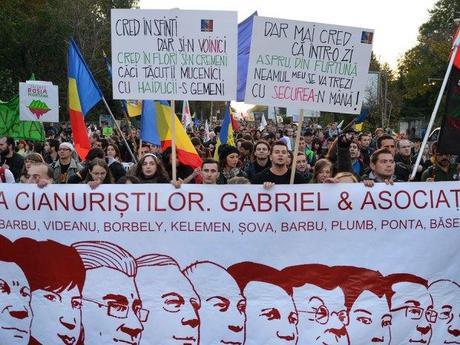
Protesters hold a banner with Romanian politicians in favor of a gold mine project during a demonstration in Bucharest against the Canadian gold mine project in October.
Armina Ligaya / Financial Post
The last lifeline for Gabriel Resources Ltd.’s controversial mining project in northwestern Romania went dead on Monday, after a parliamentary commission voted down a draft bill which would have allowed Europe’s largest open pit gold mine to move forward.
The rejection of the draft bill, which would have finally set out a course for development of the mine, came after 14 years of waiting for permits amid mounting political turbulence.
The news sent the Canadian mining company’s already-depressed stock down 10%, or 9.3¢ to close at 82.7¢ on the Toronto Stock Exchange Monday.
Jonathan Henry, the chief executive of Gabriel Resources, however, said he was “confident” there could still be “a potential path forward” for the project.
The draft bill specific to Rosia Montana was rejected, he said, but Romania may go forward with a general gold and silver mining bill which could leave the door open for Gabriel’s project, he said Monday.
“It doesn’t mean the plan is dead in the water. What they have said is that they believed that a project that was as complex as our project shouldn’t go through as a separate bill,” he said.
Still, the permitting process for Rosia Montana has started and stopped several times.
The Whitehorse-based company has invested hundreds of millions of dollars trying to develop the gold project — which involves extracting tonnes of gold and silver using cyanide in the town of Rosia Montana — since the 1990s, but has faced vicious opposition from anti-mining activists.
Debate has been fierce over whether the foreign investment and jobs created by the mine in northwestern Romania would outweigh the environmental costs, and whether the country was earning too little from the deal. Gabriel, fighting back, even helped fund a documentary called Mine Your Own Business. The film portrayed the anti-mining activists in a negative light, suggesting the mine is needed to create economic activity in an impoverished part of Romania.
On Aug. 27, Prime Minister Victor Ponta’s government approved a draft law that set out a potential course for developing the mine. But the draft law drew the ire of activists, and thousands of people took to the streets across the country in Bucharest and other cities to protest Rosia Montana. The protesters are particularly concerned about the large amount of cyanide required for the mine.
Then on Monday, the Associated Press quoted Mr. Ponta as saying his government had changed its mind on the project ahead of Monday’s voting down of the draft law.
“The ruling coalition intends to reject the project,” Mr. Ponta was quoted as saying, adding, however, that the government in principle supports foreign investment in its natural resources.
Mr. Henry, however, disputed this statement, calling it a “misinterpretation.”
“Victor Ponta did not say they intend to reject the project… I’ve got the full press transcripts of the press conference. He didn’t say that.”
But the commission of lawmakers sent a clear message Monday — rejecting the draft bill with 17 votes against and two abstentions.
The panel recommended that Gabriel’s 1999 license be declassified and made public. The commission, in its report, also suggested the need for a better legal framework covering such matters.
It added that there should be “a correct partnership between the main shareholder and the Romanian state.”
There’s a lot at stake. Rosia Montana has more than 17 million ounces of gold resources, including 10.1 million ounces of reserves. The draft law, if approved, would have given Gabriel 75% of the mine, with the state holding the balance. It is the largest gold resource on the continent.
Analysts say that Gabriel could still devise a new proposal for the mine.

